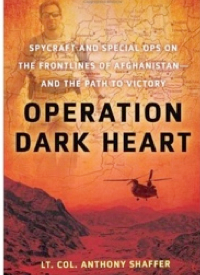
The decision of the Pentagon to consign Lt. Col. Anthony Shaffer’s memoir, Operation Dark Heart, to the flames has revealed how shallow and Janus-faced the government can be when it comes to “tolerance” and denouncing the burning of books.
When Rev. Terry Jones planned to burn copies of the Koran on the anniversary of the September 11 terrorist attacks, pundits, politicians, and even General David Petraeus worried that such book burning might result in attacks on U.S. servicemen in Afghanistan.
However, the Pentagon has engaged in book burning of its own in the recent past, burning copies of the Bible as “trash” in Afghanistan for fear that some soldier might engage in evangelism. As a Defense Department spokesman, Lt. Col. Mark Wright, told CNN:
The decision was made that it was a “force protection” measure to throw them away, because, if they did get out, it could be perceived by Afghans that the U.S. government or the U.S. military was trying to convert Muslims,
Since all such “trash” is to be burned in Afghanistan, soldiers burned the Bible for the sake of “force protection.”
Therefore, burning Bibles is deemed “good” by the government, if it keeps Jihadists from having one more excuse to do what they were going to do anyway, and intimidating American citizens to keep them from burning copies of the Koran is deemed “good” by the government, if it keep Jihadists from having one more excuse to do what they were going to do anyway.
To burn, or not to burn — that is a question where the Pentagon waits on Islamic extremists to give them the answer.
Now, it would seem that the government’s propensity for intellectual pyromania will no longer be confined to questions regarding the holy books of the two largest religions in the world. “National security” is once again being invoked as the defense for destroying the entire first edition of a book. According to a CNN report:
The Department of Defense recently purchased and destroyed thousands of copies of an Army Reserve officer’s memoir in an effort to safeguard state secrets, a spokeswoman said Saturday.
“DoD decided to purchase copies of the first printing because they contained information which could cause damage to national security,” Pentagon spokeswoman Lt. Col. April Cunningham said.
In a statement to CNN, Cunningham said defense officials observed the September 20 destruction of about 9,500 copies of Army Reserve Lt. Col. Anthony Shaffer’s new memoir “Operation Dark Heart.”
Shaffer says he was notified Friday about the Pentagon’s purchase.
“The whole premise smacks of retaliation,” Shaffer told CNN on Saturday. “Someone buying 10,000 books to suppress a story in this digital age is ludicrous.”
Given the Defense Department’s gargantuan budget, the tens of thousands of dollars expended on buying up, and destroying, the entire print run of a book is relatively trivial. What is astounding is the mental imagery of the government shoveling thousands of books into an incinerator to suppress the release of information which Shaffer’s superiors had already cleared for release, and which the Pentagon must assume was probably already compromised the moment the book was sent to the printing presses.
According to the CNN report:
Shaffer’s lawyer, Mark Zaid, said earlier this month that the book was reviewed by Shaffer’s military superiors prior to publication.
“There was a green light from the Army Reserve Command,” Zaid told CNN.
But intelligence agencies apparently raised objections when they received copies of the book.
The Pentagon contacted St. Martin’s Press in early August to convey its concerns over the release of the book. According to the publisher, at that time the first printings were just about to be shipped from its warehouse. Shaffer said he and the publisher worked hard “to make sure nothing in the book would be detrimental to national security.”
“When you look at what they took out (in the 2nd edition), it’s lunacy,” Shaffer said.
The Pentagon says Shaffer should have sought wider clearance for the memoir.
“He did clear it with Army Reserve but not with the larger Army and with Department of Defense,” Department of Defense spokesman Col. David Lapan said earlier this month. “So he did not meet the requirements under Department of Defense regulations for security review.”
Actually, one would expect that such a responsibility resided with Shaffer’s superiors, who apparently elected not to send the book any further up the chain of command.
One of the book’s first lines reads, “Here I was in Afghanistan (redaction) My job: to run the Defense Intelligence Agency’s operations out of (redaction) the hub for U.S. operations in country.”
In chapter 15, titled “Tipping Point,” 21 lines within the first two pages are blacked out.
In the memoir, Shaffer recalls his time in Afghanistan leading a black-ops team during the Bush administration. The Bronze Star medal recipient told CNN he believes the Bush administraton’s [sic] biggest mistake during that time was misunderstanding the culture there.
Apparently they have misunderstood the culture here, as well, which recoils in disgust at the idea of the government burning books. Americans expect government-sponsored book burning to be a tactic of our enemies, not our own government.
With reports that copies of the first edition that escaped the flames are selling on popular internet auction sites, from a national security perspective, any information in the first edition has been compromised. In an age in which citizens expect scandals such as Climategate and Wikileaks to break because of the actions of whistleblowers and the ability of the Internet to quickly release information to a virtually worldwide audience, book burning as a means of information suppression is nineteenth century technology in a digital age.

Photo at top: Lt. Col. Anthony Shaffer listens as Rep. Curt Weldon, R-Pa., testifies on “Able Danger” and intelligence sharing prior to the Sept. 11 attacks before the Senate Judiciary Committee on Capitol Hill, Sept. 21, 2005. Shaffer was ordered by the Pentagon not to testify: AP Images


